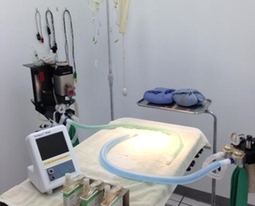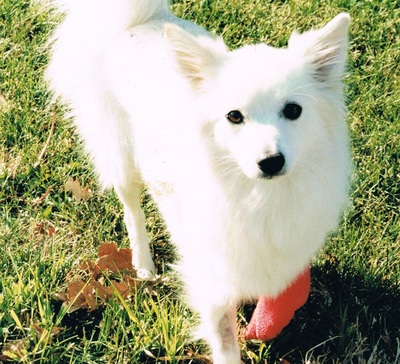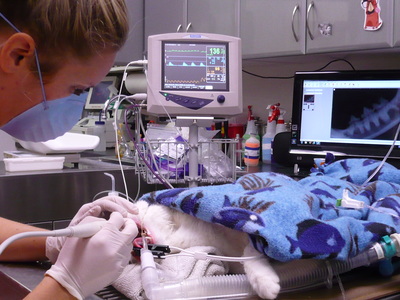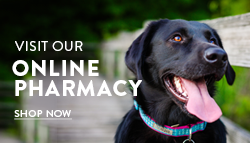What Happens When My Pet "Goes Under"?
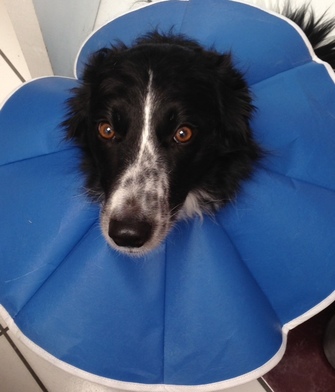
Anesthetizing your pet is a big decision. Listed below is information about our Surgical Team, Facility, and protocols. This will help you to know what to expect from us when you entrust us with your pet during a surgical procedure. If at any point you have questions, please Contact Us at 651-452-5156. In an effort to avoid unexpected changes, our surgeries are priced to included the following:
Surgical Team: Your pet will be in the sensitive and skilled hands of a trained surgical team. This includes a Veterinarian and team of trained Veterinary Technicians who are trained to handle both routine surgeries and difficult emergencies.
Hospitalization: We take your pet's care and comfort seriously. Patients are monitored during and after surgery by trained technicians. Post-operatively, pets are maintained in heated kennels as needed, including fluffy towels and blankets.
Pre-Surgical Physical Exam: A doctor will perform a complete physical exam to ensure there are no apparent physical abnormalities prior to surgery.
Pre-Surgical Lab Work: Our In-house Lab allows us to run pre-surgical lab tests on the spot. It is important to know the status of your pet's kidneys and liver values to determine whether your pet is a good candidate for anesthesia.
I.V. Catheter: An I.V. catheter allows instant access for administering anesthesia and other drugs during the procedure. This is especially important if there is an emergency. The I.V. catheter is also used to provide fluid therapy during surgery.
Anesthesia: The surgical team will induce anesthesia with injectable medications, and then intubate your pet with an endotracheal tube which delivers a mix of gas anesthesia and oxygen. While your pet is anesthetized, a technician will be with him, monitoring the vital signs, including heart rate, respiration, temperature, and anesthetic depth.
Pain Management: Surgery is painful for pets, just as with people. We administer pre-surgical pain injections, nerve blocks (if needed), and also provide post-surgical pain meds for you to give at home.
Fluid Therapy: I.V. fluids help to maintain hydration and prevent strain on the kidneys. Fluids also help a pet feel better and recover faster post-surgically.
Post Surgical Monitoring: When the surgery is completed, your pet is transferred to a recovery ward, where a certified technician continues to monitor your pet's recovery, including checking the temperature, respiration, heart rate, and general well being.
Post Surgical Home Care: When you pick up your pet after surgery, we will go over all post-op care instructions in detail and also provide you with a written version of this information, which is also available on our Patient Portal. We encourage you to call if you have any questions.
Have additional questions or need to schedule an appointment? Please Contact Us a call at 651-452-5156, Our Staff is happy to help you. Use our interactive map for directions, although we are easy to find within the Cub Food mall next to Great Clips in Eagan.
Surgical Team: Your pet will be in the sensitive and skilled hands of a trained surgical team. This includes a Veterinarian and team of trained Veterinary Technicians who are trained to handle both routine surgeries and difficult emergencies.
Hospitalization: We take your pet's care and comfort seriously. Patients are monitored during and after surgery by trained technicians. Post-operatively, pets are maintained in heated kennels as needed, including fluffy towels and blankets.
Pre-Surgical Physical Exam: A doctor will perform a complete physical exam to ensure there are no apparent physical abnormalities prior to surgery.
Pre-Surgical Lab Work: Our In-house Lab allows us to run pre-surgical lab tests on the spot. It is important to know the status of your pet's kidneys and liver values to determine whether your pet is a good candidate for anesthesia.
I.V. Catheter: An I.V. catheter allows instant access for administering anesthesia and other drugs during the procedure. This is especially important if there is an emergency. The I.V. catheter is also used to provide fluid therapy during surgery.
Anesthesia: The surgical team will induce anesthesia with injectable medications, and then intubate your pet with an endotracheal tube which delivers a mix of gas anesthesia and oxygen. While your pet is anesthetized, a technician will be with him, monitoring the vital signs, including heart rate, respiration, temperature, and anesthetic depth.
Pain Management: Surgery is painful for pets, just as with people. We administer pre-surgical pain injections, nerve blocks (if needed), and also provide post-surgical pain meds for you to give at home.
Fluid Therapy: I.V. fluids help to maintain hydration and prevent strain on the kidneys. Fluids also help a pet feel better and recover faster post-surgically.
Post Surgical Monitoring: When the surgery is completed, your pet is transferred to a recovery ward, where a certified technician continues to monitor your pet's recovery, including checking the temperature, respiration, heart rate, and general well being.
Post Surgical Home Care: When you pick up your pet after surgery, we will go over all post-op care instructions in detail and also provide you with a written version of this information, which is also available on our Patient Portal. We encourage you to call if you have any questions.
Have additional questions or need to schedule an appointment? Please Contact Us a call at 651-452-5156, Our Staff is happy to help you. Use our interactive map for directions, although we are easy to find within the Cub Food mall next to Great Clips in Eagan.
